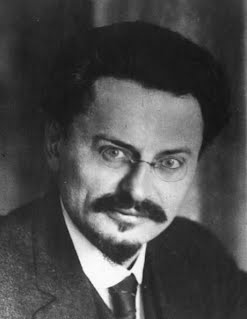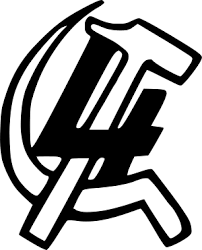More languages
More actions
Leon Trotsky Лев Троцький | |
|---|---|
 | |
| Born | Lev Davidovich Bronstein 7 November 1879 Yanovka, Kherson Governorate, Russian Empire |
| Died | 21 August 1940 Mexico City, Mexico |
| Cause of death | Assassination via iceaxe |
| Political orientation | Trotskyism |
| Part of a series on |
| Trotskyism |
|---|
 |
Lev Davidovich Bronstein (7 November 1879 – 21 August 1940), better known as Leon Trotsky, was a controversial figure of the Russian Revolution who was later found to have disgraced himself by working in league with the fascists and U.S. intelligence services,[1] as revealed during the interrogations of the Moscow Trials.
Biographical sketch
Trotsky was known to have a flair for making speeches and being a charismatic person. For instance, he was reported to have spoken in Russian, French and German straight for an hour each when given an hour to defend his position. He was also known to have an aristocratic and condescending attitude, being described as a "loner" by M. N. Roy.
Pre-revolution
Early life
Trotsky was a Menshevik from 1903 to 1905.[2] He supported the Russian imperial forces against Japan in the Russo-Japanese War, while Lenin believed the defeat of the tsarist government would strengthen the revolutionary movement.[3] Trotsky organized the August Bloc in 1912, which included liquidationists, Mensheviks, and Otzovists. Trotsky himself was a liquidator during this period.[4] During the First World War, Trotsky promoted class collaborationism between the Russian bourgeoisie and proletariat against other nations.[5]
Trotsky joined the Mezhrayontsi group in 1913, which occupied a position between the Bolsheviks and Mensheviks. They were admitted to the Bolshevik Party in August 1917 at the 6th party congress.[6]
Post-revolution
Trotsky opposed the New Economic Policy.[7] He soon went in opposition to Lenin and formed an opposition bloc in 1926 with Zinoviev. A joint meeting of the Central Committee and the Central Control Commission expelled Trotsky from the party in November 1927.[8] He argued that Stalin's government had entered a stage of bureaucracy and believed that terrorism against the Soviet Union was inevitable.[9]
Exile
After being exiled from the Soviet Union, Trotsky offered to provide information to U.S. intelligence services in exchange for political asylum in the United States. The U.S. refused to give him asylum and he moved to Mexico. He gave U.S. officials in Mexico information about communists and Comintern agents and received financial contributions from wealthy Statesians.
In 1932, Trotsky organized an anti-Leninist opposition bloc that included Trotskyists, Zinovievites, and left-communists.
In the 1930s, Trotsky argued that the Soviet Union would inevitably lose the upcoming Second World War to Japan and Nazi Germany. He believed that it was necessary to overthrow the Soviet government to save the country from encircling capitalist armies.[9] He also blamed Stalin and the Comintern for Hitler's rise to power. He continued to consider the Soviet economy socialist but believed the CPSU was corrupt and reactionary.[10]
Trotsky supported Tukhachevsky's plot to overthrow Stalin and favored the military leadership of the Red Army over the political commissars. By 1938, he was openly advocating the overthrow of the CPSU. He said that, "whoever defends, directly or indirectly, Stalin and the Bolshevik Party, is the worst enemy of socialism" and called for a fourth Russian revolution.[11]
Theoretical criticisms
Trotsky claimed that socialism in one country was impossible.[9] He underplayed the importance of the national question and rejected an alliance between the proletariat and the peasants.[7]
Legacy
Trotskyism has proven to be a major diversion in the workers' movement even after Trotsky's death.[citation needed]
Further reading
References
- ↑ "Trotsky and Rivera were informants of the US government – American Researchers reveal" (2015-06-20). Stalin Society of Pakistan. Archived from the original on 2022-07-15. Retrieved 2022-07-31.
- ↑ TheFinnishBolshevik (2016-12-20). "Stalin & the myth of the ”Old Bolsheviks”" ML-Theory. Archived from the original on 2022-06-22. Retrieved 2022-08-07.
- ↑ Joseph Stalin (1939). History of the Communist Party of the Soviet Union (Bolsheviks): 'The Mensheviks and the Bolsheviks in the Period of the Russo-Japanese War and the First Russian Revolution'. [MIA]
- ↑ Joseph Stalin (1939). History of the Communist Party of the Soviet Union (Bolsheviks): 'The Mensheviks and the Bolsheviks in the Period of the Stolypin Reaction. The Bolsheviks Constitute Themselves an Independent Marxist Party'. [MIA]
- ↑ Joseph Stalin (1939). History of the Communist Party of the Soviet Union (Bolsheviks): 'The Bolshevik Party in the Period of the Imperialist War. The Second Revolution in Russia'. [MIA]
- ↑ Joseph Stalin (1939). History of the Communist Party of the Soviet Union (Bolsheviks): 'The Bolshevik Party in the Period of Preparation and Realization of the October Socialist Revolution'. [MIA]
- ↑ 7.0 7.1 Joseph Stalin (1939). History of the Communist Party of the Soviet Union (Bolsheviks): 'The Bolshevik Party in the Period of Transition to the Peaceful Work of Economic Restoration'. [MIA]
- ↑ Joseph Stalin (1939). History of the Communist Party of the Soviet Union (Bolsheviks): 'The Bolshevik Party in the Struggle for the Socialist Industrialization of the Country'. [MIA]
- ↑ 9.0 9.1 9.2 TheFinnishBolshevik (2022-07-03). "Analyzing the Moscow Trials" ML-Theory. Retrieved 2022-07-23.
- ↑ Ludo Martens (1996). Another View of Stalin: 'The Great Purge' (pp. 120–121). [PDF] Editions EPO. ISBN 9782872620814
- ↑ Ludo Martens (1996). Another View of Stalin: 'Trotsky's role on the eve of the Second World War' (pp. 177–181). [PDF] Editions EPO. ISBN 9782872620814
